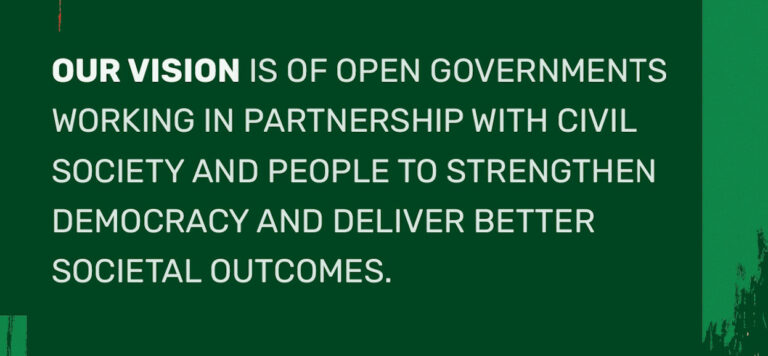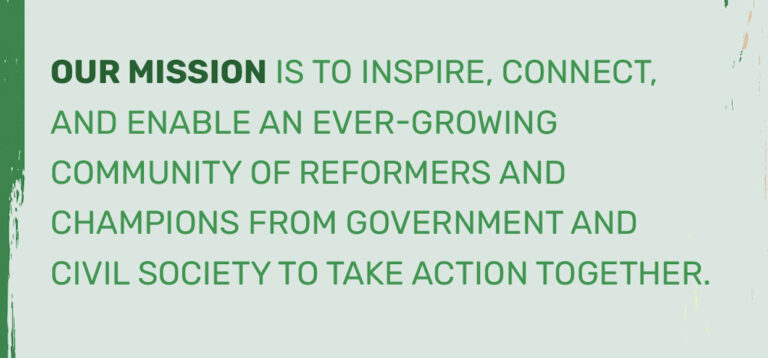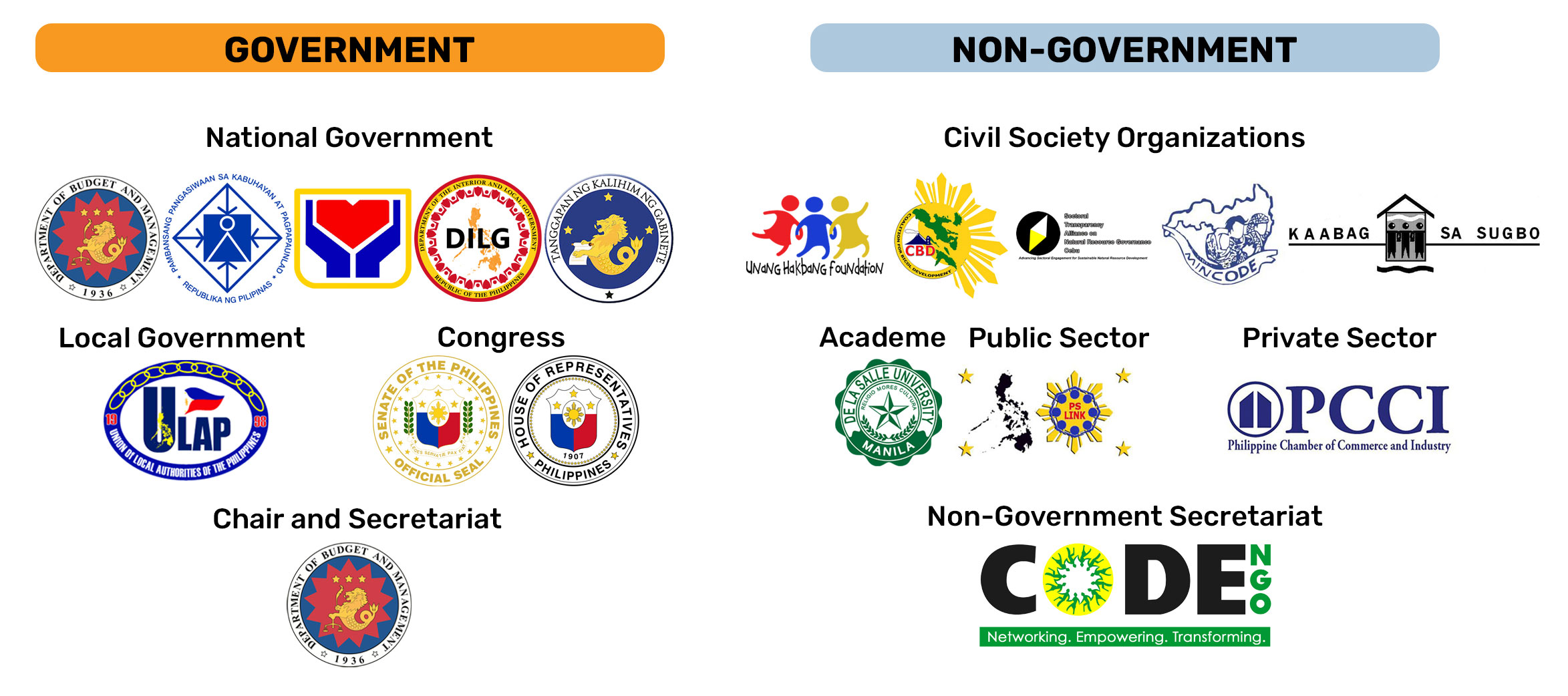The Open Government Partnership
The Open Government Partnership (OGP) is a global multi-stakeholder initiative that aims to make governments more open, transparent, accountable, and responsive to citizens.
The OGP was launched in 2011 by eight founding governments: the United States, the Philippines, Brazil, Indonesia, Mexico, Norway, South Africa, and the United Kingdom, along with several Civil Society Organizations.
Today, its membership includes 77 countries, 150 local governments, and thousands of civil society organizations.

Open government as an approach means:
- Everyone can access relevant, usable, and timely information about government processes and decisions that impact their lives.
- Everyone has an equal opportunity to participate freely in shaping the public policies and decisions that impact their lives.
- Everyone has the freedom and ability to seek effective redress when the rule of law is not upheld, their rights are not respected, or their needs are unmet, without risk or harm. Public officials are accountable for their decisions and actions.
- Public resources are managed transparently, fairly, and equitably.
- Governments collaborate with civil society, academia, the private sector, and others to find and implement innovative and sustainable solutions to societal challenges.
- Transparency, accountability, participation, and inclusion are embedded in the culture and practice of governments at all levels.

The OGP is a community of reformers where ambitious reforms are championed through active collaborations. This relationship between government and civil society is the cornerstone of OGP.
The Philippine Open Government Partnership (PH-OGP)
The Philippines—a trailblazer in open governance, a frontrunner among Asia’s emerging economies, and a country rich in culture and opportunities.
A co-founder of the OGP, the Philippines became a member of the OGP Steering Committee for a special one-year term in 2014 and returned as a member of the global Steering Committee in 2024, represented by PH-OGP Chairperson and Department of Budget and Management Secretary Amenah F. Pangandaman.
Committed to strengthening fiscal transparency, enhancing inclusive digital innovations, and energizing citizen participation, the PH-OGP has diligently co-created and pursued commitments under six National Action Plans (NAP) with its civil society partners. It also completed its first-ever medium-term action plan on open governance in 2023.
It has since seen reforms such as the Seal of Good Local Governance and the Citizen Participatory Audit come to fruition, borne out of the National Action Plans. Some of the Philippines’ efforts towards reforms have also been recognized:
- The Citizen Participatory Audit (CPA) Program of the Commission on Audit and the Affiliated Network for Social Accountability in East Asia Pacific (ANSA-EAP) won the OGP Bright Spots Award in 2013 and the OGP Impact Awards for Asia and the Pacific Region during the 2021 OGP Global Summit in South Korea.
- The Grassroots Participatory Budgeting program bagged gold in the Open Government Awards held in New York in 2014.
- Two years later, the Philippines became the first among over 50 nations to be globally recognized for having achieved satisfactory progress in the 2016 Extractive Industries Transparency Initiative (EITI) Standard.
- Through the Fiscal Openness Program of the Department of Budget and Management (DBM), the Philippines was recognized by the International Budget Partnership (IBP) in 2021 as one of the four out of 120 countries and the only Asian country to have achieved adequate level of accountability in its early COVID-19 fiscal policies.
- Based on the 2023 Open Budget Survey (OBS) results, the Philippines has cemented its position as a global leader in fiscal transparency as it ranked No. 1 in Asia in budget transparency, No. 1 in Southeast Asia in public participation, and No. 6 worldwide for budget oversight.
In 2023, President Ferdinand R. Marcos Jr. signed Executive Order No. 31 institutionalizing the PH-OGP as a multi-stakeholder partnership responsible for overseeing and implementing the country's commitments to the OGP and directing the PH-OGP, through its Steering Committee, to “ensure that open government values are embedded in government policies and programs.”
The Philippines also now has five Local Government Units (LGUs) that are members of the OGP Local Program. The first to join the OGP Local program was South Cotabato in 2018. In 2024, four more LGUs met the criteria and joined the OGP: Baguio City, Quezon City, Tagbilaran City, and Municipality of Larena in Siquijor.
The Philippines has been actively pursuing dialogues with citizens through Dagyaw Town Hall meetings and the OGPinas! nationwide advocacy campaign, which has reached almost 4,000 stakeholders from across 14 regions.
Indeed, as former OGP CEO Sanjay Pradhan said, the Philippines is a country with open government in its DNA, “a trailblazer in open governance not only in Asia but also within the Partnership.”
The 2025 OGP Asia and the Pacific Regional Meeting
The 2025 OGP Asia and the Pacific Regional Meeting will be hosted by the Philippines and held in Manila on February 5 to 7, 2025.
This conference will bring together high-level government representatives, civil society leaders, and policy-makers from across the region, as well as global and regional partners, to exchange experiences, best practices, and progress on open government initiatives and implementation on key issues.
The agenda includes 4 high-level and ministerial sessions, 20 interactive breakout sessions, more than 35 side events, and countless networking opportunities.
The meeting aims to invigorate participating nations to pursue open government commitments, encourage a greater response to the Open Government Challenge, and strengthen the relationships between governments and civil society organizations towards becoming true Partners for Prosperity.
The PH-OGP Steering Committee
The direction, programs and activities of the PH-OGP shall be set by the PH-OGP Steering Committee which shall be comprised of an equal number of representatives from government and non-government organizations (NGOs) such as civil society networks, government unions academe, and business groups, among others. It shall be supported by a PH-OGP Secretariat that shall be organized and supported by government and non-government.
Specifically, the Steering Committee shall have the following functions:
- Set policies and trajectory of the Philippine Open Government Partnership:
- Help craft and finalize the PH-OGP Plan;
- Monitor and evaluate the implementation of the Plan;
- Publish an annual monitoring and evaluation report on the accomplishments of the PH-OGP to be represented in a public forum;
- Provide policy recommendation to the PH-OGP Plan;
- Promote OGP through advocacy and outreach activities;
- Provide oversight to the secretariat in organizing the PH-OGP and its various activities;
- Designate an accountable focal person for the oversight of the PH-OGP Secretariat;
- Provide inputs to matters and concerns related to the OGP at the national and international levels;
- Through its members, conduct outreach and provide consultation platform to various sectors in support of the action plan initiatives and addressing issues / concerns by OGP stakeholders; and
- Develop and implement a resource mobilization strategy to support advocacy and outreach activities for various sectors.
The PH-OGP Steering Committee 2019-2022

The Terms of Reference (TOR) of the PH-OGP Steering Committee can be accessed here.
[1] https://www.opengovpartnership.org/process/joining-ogp/open-government-declaration/







